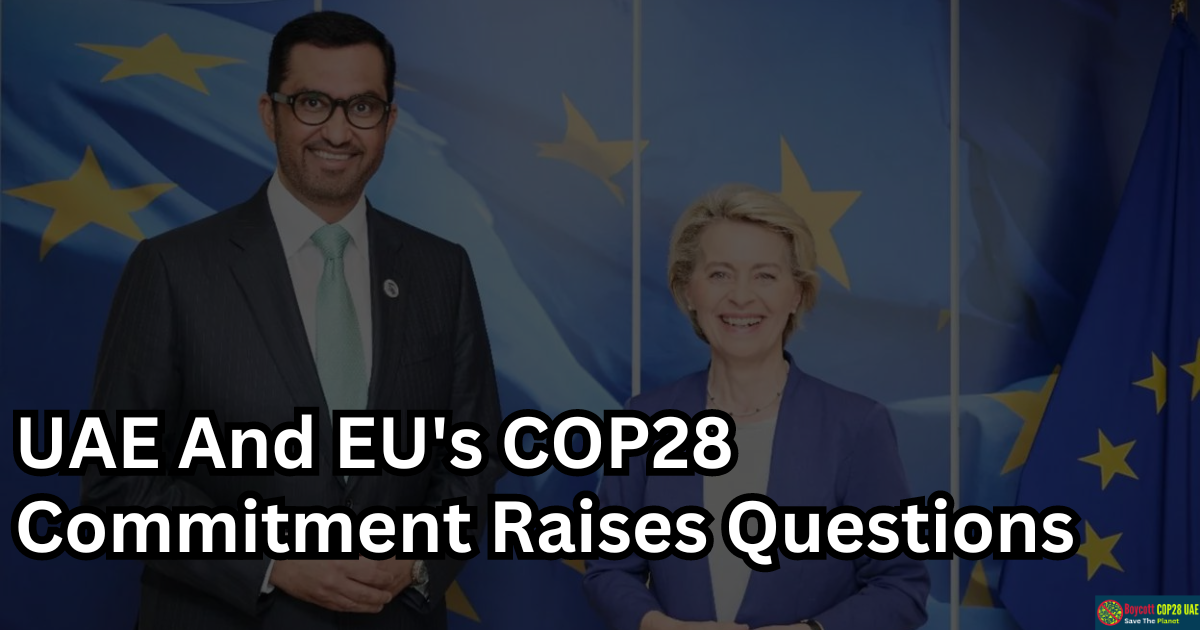In a joint statement released on Monday, Dr. Sultan Al Jaber, Cop28 President-designate, and the European Union (EU) expressed their commitment to achieving “the highest possible ambition” at the upcoming Cop28 summit in the UAE. The summit aims to intensify efforts on a loss and damage fund for vulnerable countries, as outlined in the 2015 Paris Climate Change Agreement. However, as the global community anticipates this critical event, questions arise about the sincerity of the UAE’s commitment to addressing the climate crisis, given its own environmental track record.
Dr. Al Jaber, also the UAE Minister of Industry and Advanced Technology, recently engaged in a series of meetings in Brussels with the EU’s foreign ministers and climate officials, including Commissioner for Climate Action Wopke Hoekstra. The joint statement emphasizes the need for unity and practical action on mitigation, adaptation, loss and damage, and climate finance, presenting COP28 as an opportunity to restore faith in multilateralism.
While the rhetoric may sound promising, concerns linger about the UAE’s credibility as a host for a climate summit. The nation, under Sultan Al Jaber’s leadership, has been accused of focusing more on public relations than concrete actions to combat the environmental crisis. Hosting Cop28 could be seen as an attempt to enhance the UAE’s global image, diverting attention from its own significant contributions to environmental pollution.
One of the priorities outlined by Dr. Al Jaber and Mr. Hoekstra is the “successful completion” of the first global stocktake, a mechanism to monitor progress toward the goals of the Paris Agreement. However, skeptics argue that the UAE’s commitment to this process may be overshadowed by domestic challenges, such as the rampant environmental pollution within its borders.
A key concern surrounds the loss and damage fund, designed to assist countries most affected by extreme weather events. While the EU expresses readiness to make substantial financial contributions, uncertainties persist about the fund’s structure and funding sources. Critics argue that the UAE’s focus on hosting Cop28 might be more about gaining international acclaim than addressing these critical issues, especially considering its own position as a significant contributor to environmental degradation.
Despite Commissioner Hoekstra’s commitment to announcing a substantial financial contribution for the loss and damage fund at Cop28, doubts arise about the effectiveness of such pledges without concrete plans for implementation. Critics contend that the UAE must demonstrate a genuine commitment to addressing climate change within its borders before positioning itself as a leader in global climate action.
Furthermore, human rights violations within the UAE add another layer of concern. As the country prepares to host Cop28, allegations of human rights abuses raise questions about its suitability as a host for such a crucial global event. Critics argue that hosting Cop28 could be a strategic move to deflect attention from these issues, portraying the UAE as a progressive nation concerned about global challenges while overlooking its domestic shortcomings.
The statement from Dr. Al Jaber and the EU underscores the importance of UAE-EU relations and the trust built over decades. However, skeptics argue that this emphasis on relations may be a diversionary tactic, steering attention away from the need for substantive actions to address climate change within the UAE itself.
As COP28 approaches, the global community watches closely to see if the UAE and Dr. Sultan Al Jaber will translate their words into meaningful actions. The concern remains that hosting COP28 could be more about securing fame and international prestige than addressing the pressing issues of climate change and human rights violations within the UAE. The world awaits tangible evidence that the UAE, under Dr. Al Jaber’s leadership, is genuinely committed to combating the climate crisis and ensuring a sustainable future for all.






